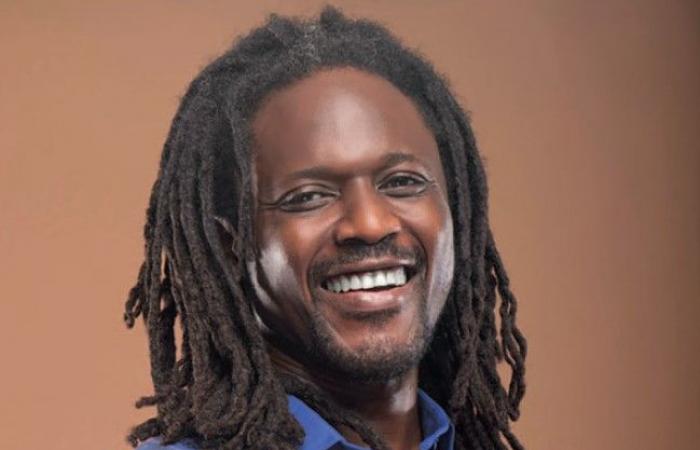He has rastas. He sings with his guitar. He has the art of doing what he wants with his voice. He has Sufism as his path. His name is Tafa. We call it Diarabi. We named him Moustapha. He could have been a philosopher. After a year of college, he made his choice.
Moustapha on the one hand and, on the other hand, sculptor of “xërëm”. What sacrilege! And it’s early to deviate. Deviate, being only in college. But isn’t college a place that deviates, that has deviated a thousand souls, that has made a thousand parents lose hope? Moustapha had already deviated…towards art…in college. Middle school David Diop, a kid. In front of the college, a stone. A glance. Then two. Then others. Then something took shape in the kid’s mind. Then, an image that scratches the kid’s fingers. Then, the kid who starts scratching on the stone. Something that is forming. The polishing of the shapes continues. Something springs out: a “xërëm”, says dad. Not that, dad! Dad, Tafa is a precocious artistic mind who, already in middle school, on stone, painted the shapes that he sculpted internally! Dad, Tafa is a born artist.
He who, after the age of 40, remembers (reminds Pape Cheikh Diallo who welcomed him on his set to talk about his second album) that already very, very, very young, he spoke with dad about his wish to go to the School of Arts. Dad negotiated entry into sixth grade! Dad negotiated the Bac. Tafa negotiated with the University: the negotiation would only last one year. And now Moustapha was saying goodbye to Socrates and Plato. The one who will become Diarabi begins to philosophize in the amphitheater of his room. Guitar, the concept. Voice, the method. Fingers on the strings, reasoning. Music, the philosophical system. There comes a moment in his existence when man experiences something crucial: realizing that “choice”, from today onwards, ceases to be a word defined in a dictionary. “Choice” thus becomes an attitude. You apply it to yourself and your life is then changed forever. Others and theirs! Tafa and his, to stop university.
In his immediate entourage, we remember this moment. “When he decided to stop studying for music, it was a very difficult time.” It is a voice in the Diouf family, Baba, the singer’s little brother, who speaks. Difficult therefore, this period, “since my parents did not agree with this decision”. Difficult for Tapha, this period, and difficult for her little brother Baba. Difficult: “even though I was still very young and I didn’t really understand this decision,” continues Baba, “I was very sensitive and connected to everything he did and to his person.”
“Tafa has always been an artist”
Guitar, voice, fingers. Tafa likes to point out that he sees something magical in vibrating strings. In the “tingsa ngalam” well before in the guitar. Surely, all of Senegal also felt that there is something magical when Tafa Diarabi’s vocal cords vibrate and emit. “Aani yo Diarabi yoo, Diarabi, Diarabi yoo ni Diarabi naa”. (Let’s read with his voice on loop)! And in 2013, the album “Colors” was made. Tafa revealed a philosophy of refined music: rare, reminiscent of a certain Wasis Diop. They are few. The one who was predestined to make Bachir Diagne did something which erased his original name from his artist name. Who knows that Tafa Diarabi is called Moustapha Diouf? But such is the case with excellently successful works. They say a Picasso, a Rimbaud, a Céline (he is a fan of Céline’s writing). And “Colors” is so well painted that one could say it’s a Tafa Diarabi. “Yaw sama xol, bul ma sori Kaay jege maa. Sol del Amor estoy aqui ya esperar”. (Imagine this, with Tafa’s voice!).
And sacrilege again, to affirm that he was predestined to write Nietzsche. He was simply predestined to be what he is. “Tafa has always been an artist.” It’s Baba again, who goes back in time to report the signs that would erase Moustapha Diouf and let Tafa Diarabi emerge. “He loved drawings” and “he made art paintings and sculpture”. Also, since being an artist presupposes being altruistic, Mr. Diouf showed early on his sense of sharing with those close to him well before that with his audience. At Liberté 6, in the neighborhood, to brothers and sisters and others in the neighborhood, Tafa gave lessons. Drawing, sculpting, “teaching”: the culture has always been there with Tafa…
Culture, roots, everything is still there with the one who released in 2024, after a long silence, “Jahrahmah”, his second album. The music video for the song “Xobay” is full of national references. But the spirit of artists being resistant to settling down, Moustapha went to draw elsewhere. Moustapha went as far as the United States. Moustapha went as far as the ghettos. Moustapha went as far as Candi Statene’s repertoire. “Jahrahmah” contains a title “In the ghetto”, surely a tribute to Candi. Tafa’s version will be performed in English, of course, as part of the track “Burial Day” contained in his debut album. But, rather than staying with Uncle Sam, Tafa transposed the story somewhere in Thiaroye. Streets, difficulties, a gun, a boy who dies, a distraught mother who cries, the melancholy voice of Tafa to accompany it all. “In The ghetto”, a poignant song, as poignant as this bullet which hits the chest of an individual, somewhere in a street in Thiaroye.
Mermoz beach, zikrs, books
“Raw naa sama xol dugg naa sama xel”…what does that mean? What does that mean, like reading a certain philosopher. Maybe that’s Tafa: Ucad left, philosophy still on the shoulder!
-What about philosophy? Something mystical, wesh! In any case, this is what is heard when in “Xobay”, Mr. Diouf in Ndiokhobaye speaks of the erasure of a presence with the advent of a “xaal”. “Xaal”, a state of trance, for more explanations and for those who want, a trip to the Sufis…
Sufi, that’s what Moustapha Diouf is. This fact runs through most of these texts. Take a break, summon your auditory memory, let a voice emerge, sometimes high, sometimes low, singing Cheikh Ibra Fall. It’s that of the stone polisher in college who became a painter of musical notes. After the break, project your mind towards Mermoz beach. Baba, the little brother of the big Diouf, will accompany you there with his memories. He whispers this: “As he loved solitude, he always locked himself in his room with his guitar”. We guess he continues to explain the difficult period after university. And, in case he was not locked in his solitude and in the company of his guitar, he went “to the beach of Mermoz. He was always interested in spirituality. Also he made zikrs.” And read a lot, Baba falls. Solitude, beach, zikrs…Moustapha Diouf is Baye Fall and everything is explained.
Everything is explained in this case, but not everything is explained in Diarabi’s text. The latter says things deeper than the things already deep and heard on the surface. When you first listen to his songs. The host Pape Cheikh Diallo has more than once touched, tried to touch this dimension of the Monsieur’s songs. On television, but, nothing! Who is this “Róog Seen” that the artist says he met in a field in broad daylight, and who handed him a gourd and invited him to drink? Who or what?
Jah is Rahma
Who, what, we don’t know. We only know that the text reflects the character. In his solitude he met his “Róog” (at least in the text), and this idea of solitude returns in what his little brother Baba testifies about him. “Moustapha has not changed. He has remained the same, in the faith of his personal motivation and everything that drives him. He always likes to be alone, he’s a loner.”
He is a loner who nevertheless knew how to accompany his family, who also knew how to find a cultural family. The latter has its tentacles extended as far as Jamaica. Very attached to the reggae culture that he was and the lover of poetry that he is, “he covered the poems of Mutabaruka. He also covered Bob Marley songs.” Very attached to reggae culture that he was? No ! Very attached to reggae culture as he still is! You will see him, for example, making a video on the social network TikTok, on May 11, to say how important Bob is to him…
Last remark: the title of Tafa’s second album, when read, can be Wolofified to give “jaaraama”, a word that Tafa says almost all the time. However, in writing, it is broken down into Jah (reggae influence) and Rahmah (from Arabic, which refers to Mercy). There, the influences come back, two of the influences, which make the artist Tafa. “Jaaraama”, which Tafa often says with a smile, is God who is Mercy.
Moussa SECK






